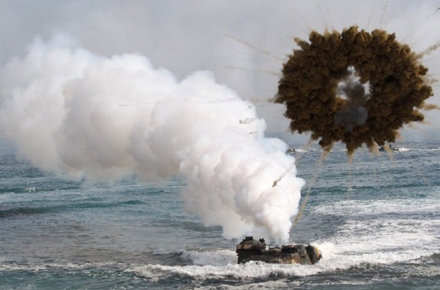Playing with fire
South Korean response to North Korea artillery fire justified, ANU international security experts say.
A ratcheting up of military provocation between North and South Korea is unlikely to occur in the near future, despite a recent exchange of artillery fire across a disputed maritime border, ANU experts say.
The North reportedly fired around 500 artillery shells off its southern coast on Monday. About 100 landed within the South’s side of the disputed border.
Marines in South Korean border islands responded by firing back.
The incident isn’t likely to result in a ratcheting up of military provocation between the two countries, says Professor Brendan Taylor, head of the Strategic and Defence Studies Centre in the ANU College of Asia and the Pacific.
“Exchanges between the North and South have been relatively frequent since the cessation of hostilities in the Korean War in 1953,” he pointed out.
Aside from separate incidents in 2010, when North Korea allegedly sank a South Korean naval corvette and shelled a South Korean island, there had been no loss of life or significant damage to property.
“So escalation is unlikely to occur at present,” Taylor said.
But it was still a concern that the North was continuing to improve its nuclear and missile capabilities.
“There is a real risk that it will become more adventurous in its future provocations, to the point that the South is forced to respond more forcefully in response to its own domestic political pressures,” he warned.
Colleague Dr Ron Huisken described North Korea’s behaviour on Monday as another example of “relatively inoffensive aggression”.
But the incidents of 2010 gave such behaviour added potency.
Monday’s incident occurred in the same location where North Korea shelled the South Korean occupied island.
“The symbolism was important. But other than that, it seems to be part of a peculiar mind game that North Korea seems to insist on playing,” Huisken maintained.
Both Taylor and Huisken believe South Korea reacted appropriately by returning fire.
“Preservation of the peace on the Korean Peninsula relies in part on the ability of the US and South Korea to successfully deter the North from more adventurous or damaging provocations, by showing their willingness and capability to respond forcefully to those,” Taylor said.
He added the South was incredibly restrained in 2010, by not responding to the North’s sinking of the naval corvette and its bombardment of a South Korean island.
“But there are limits as to how much restraint the South Korean public will tolerate, so for domestic political reasons, some response to the North’s latest provocation was necessary,” he said.







